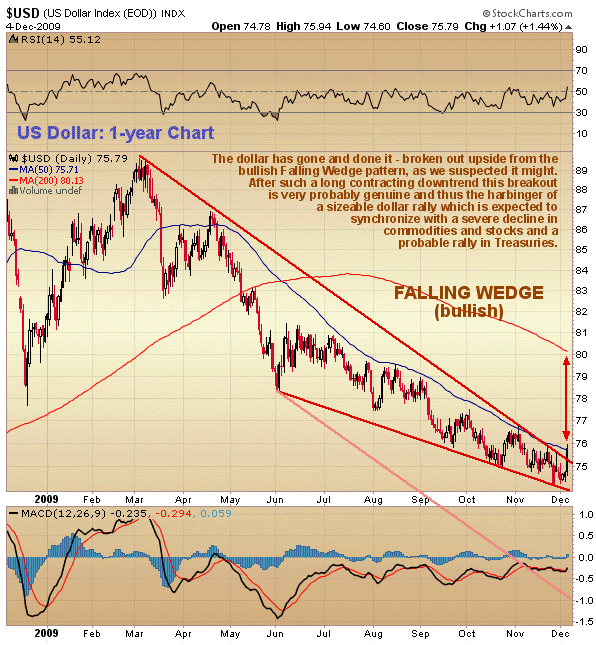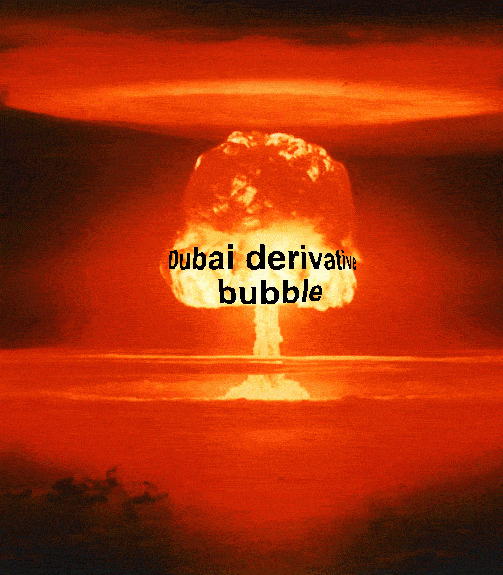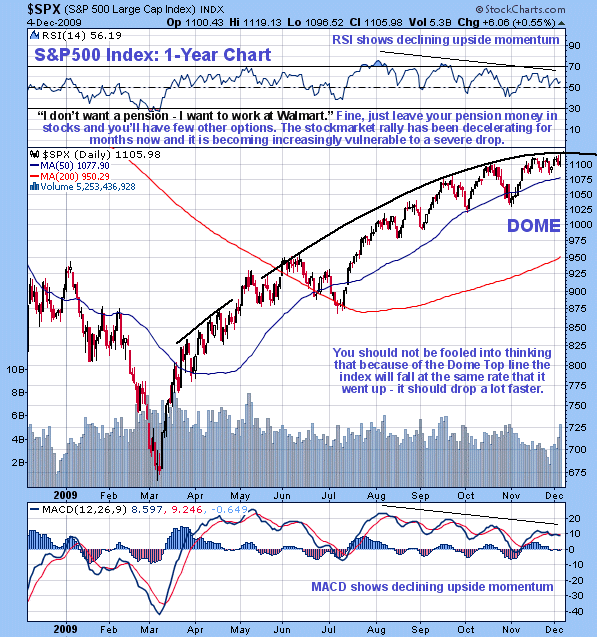Dubai Derivatives Financial Nuclear Blast Shockwave to Hit
Commodities / Financial Markets 2009 Dec 06, 2009 - 08:56 PM GMTBy: Clive_Maund
 We got the heavy reaction in gold that we had been expecting for some days on Friday. The problem is that we also got a big important breakout in the dollar, which we had acknowledged as a significant possibility for some time. This is not good news for commodities and not good news for the stockmarket either as it signifies the onset of a flight to cash such as we witnessed last year
We got the heavy reaction in gold that we had been expecting for some days on Friday. The problem is that we also got a big important breakout in the dollar, which we had acknowledged as a significant possibility for some time. This is not good news for commodities and not good news for the stockmarket either as it signifies the onset of a flight to cash such as we witnessed last year

What was really odd about yesterday was that we saw a big dollar breakout, but Treasuries fell heavily. We are now believed to be on the verge of another massive deflationary downwave, similar to last year, but worse. However, this time it is very possible that while we will see a flight to cash, we will not witness a stampede into Treasuries, or at least not on anywhere near the same scale. So what is going on here? - what are the principal underlying dynamics? Anyone who has had the misfortune to watch a nuke exploding, misfortune because you get irradiated, knows that first you see a very bright flash, then there is a period of tranquillity as the flash dies down and the mushroom cloud starts to rise, before the shockwave hits, when things get pretty rough to say the least.

Youv'e seen the flash - now get ready for the shockwave...
What happened in Dubai just over a week ago was the bright flash, and the media have used the intervening period before the shockwave hits to reassure everyone that everything is going to be just fine - "You just relax, nothing will come of it, it's only $60 billion down the drain or whatever - have a cup of tea". The trouble is that it's not $60 billion at all - the reality is that this is a default on a massively larger scale. Dubai was a vast sinkhole into which western banks and governments unquestioningly poured not just billions but trillions of dollars which was then leveraged enormously by means of derivatives enabling Dubai to build itself up into a latter day Rome, with a level of opulence and extravagence that would have made Caesar green with envy.

When people think of Dubai the things that come to mind are the massively extravagent 7-star hotels, the towering record breaking skyscraper, palm-shaped island resort complexes etc and forests of new office buildings and apartments etc. What the vast majority don't realize is that the stupendous leverage afforded by derivatives has in addition enabled Dubai to create an immense global empire of businesses, most of the elements of which are broke, having racked up staggering levels of debt. Dubai is the nexus of the derivatives pyramid and it is flat, stony broke. Where did all the money come from to pay for all these things? - why from taxpayers and pension fund contributors the world over of course, but especially in the US, with Wall St acting as a giant conduit sluicing a torrent of cash into Dubai. The interesting thing is that there was never any accountability - countries and companies vied with each other for the privelege of pumping money into the exalted kingdom, seduced by its supposedly limitless oil wealth, and requesting or requiring guarantees was regarded as impolite.
Now that Dubai is broke, the Dubai government has suddenly distanced itself from Dubai World, and the attitude towards the Western banks and governments who have poured trillions into Dubai is "Tough luck - you lose, suckers". What this means is that trillions of dollars which are now counted as assets on the balance sheets of banks worldwide and especially in the US are actually liabilities. So what do you think is going to happen to the stock prices of these banks - and stockmarkets generally, when the world wakes up and acknowledges this reality - when the shockwave hits?? Small wonder that the charts for Goldman Sachs and J P Morgan look very like the market charts before the '87 crash, but that was "small potatoes" compared to what is coming down the pipe this time.

Go ahead, take a good look at it - after all, You helped pay for it!.
If money panics out of commodities and stocks it has to go somewhere. Last year, as we know, it took refuge in US Treasuries, especially short-term Treasuries and it drove the dollar up as massive across the board liquidation went first into cash which was then used to buy Treasuries. While we can expect a similar dynamic to be in play this time round, largely because most investors simply don't have the imagination to think of an alternative to US Treasuries, there is a complicating factor, as highlighted repeatedly by Karl Denninger in his recent highly pertinent articles, which is that the US has been making a mockery of foreign Treasury buyers on an ever increasing scale with its endless monetization and ramping of the money supply - in effect treating them as morons by paying them zilch interest rates and undermining the dollar at the same time.
They are right - they are morons, who are one way or another are going to get what's coming to them - after all, who but an imbecile buys the debt of a bankrupt country? However, there is a saying that "you can't fool all of the people all of the time" and foreign Treasury buyers and holders are getting increasingly fed up with their cavalier treatment at the hands of the US, and, in the absence of another deflationary implosion causing a renewed flight into the dollar and Treasuries, they look set to start dumping them, which as Denninger points out would set in train a "death spiral" of rising interest rates one consequence of which would obviously be a crashing stockmarket. So whether we see a rising dollar or a falling dollar it`s "Zugzwang" for the US stockmarket and economy - any move made loses, as does no move.
The rate of advance of the broad stockmarket has been slowing for months. On the 6-month chart for the S&P500 index we can see that it appears to have arrived at the top point of a large "Distribution Dome". If this Dome is valid - and it appears to be so - then we can expect the market to turn seriously lower soon, and we should remain aware that markets generally drop twice as fast as they go up, so it will not have to contact the Dome boundary on the way down - on the contrary, given the parlous fundamentals outlined above it will probably drop like a rock.

Bank stocks look set to be particularly hard hit in the event of a second downwave. This is apparent from their deteriorating relative strength in recent months - they are already very close to crashing key support as is clear on the charts for Mordor website - Goldman Sachs and J P Morgan. These 2 elite companies have had the richest of pickings during the financial crisis - being at the front of the line for everything, which is why their stock prices recovered so well - and because of this they are widely assumed to be invulnerable. They are not expected to be spared during the second downwave however, and their current lofty valuations make them a good candidate for shorting or Put options.
Goldman Sachs and J P Morgan chart analysis and Put option information follows for subscribers.
By Clive Maund
CliveMaund.com
For billing & subscription questions: subscriptions@clivemaund.com
© 2009 Clive Maund - The above represents the opinion and analysis of Mr. Maund, based on data available to him, at the time of writing. Mr. Maunds opinions are his own, and are not a recommendation or an offer to buy or sell securities. No responsibility can be accepted for losses that may result as a consequence of trading on the basis of this analysis.
Mr. Maund is an independent analyst who receives no compensation of any kind from any groups, individuals or corporations mentioned in his reports. As trading and investing in any financial markets may involve serious risk of loss, Mr. Maund recommends that you consult with a qualified investment advisor, one licensed by appropriate regulatory agencies in your legal jurisdiction and do your own due diligence and research when making any kind of a transaction with financial ramifications.
Clive Maund Archive |
© 2005-2022 http://www.MarketOracle.co.uk - The Market Oracle is a FREE Daily Financial Markets Analysis & Forecasting online publication.



